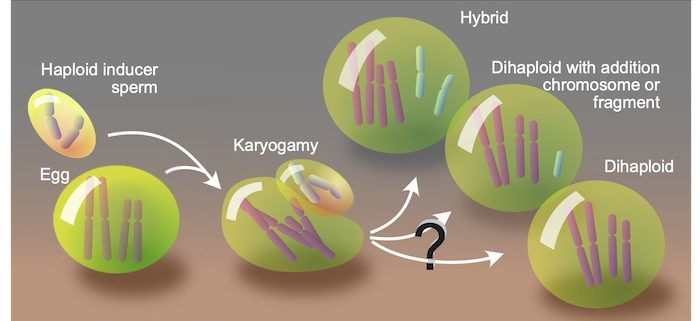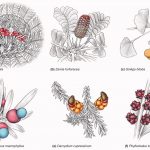Exploring the parental origin of potato dihaploid DNA
Amundson et al. investigate the fate of parental DNA in crosses that produce uniparental dihaploids
By Kirk Amundson and Luca Comai
Background: Plants carrying only the chromosomes of one parent, i.e. haploids, are very useful for research and breeding. Certain crosses are known to yield haploid plants, such as the pollination of potato tetraploids by diploids called haploid inducers. The progeny of such crosses include hybrids (either triploid or tetraploid), as well as haploidized tetraploids (dihaploids) that lack chromosomes from the haploid inducer parent. The formation of potato dihaploids is mysterious: Do unfertilized eggs form embryos, or do hybrid embryos cast away the chromosomes from the haploid inducer? To better understand the basis of haploid induction in potato, we sequenced and analyzed the genomes of over 900 haploid and 100 hybrid progeny obtained from potato haploid induction crosses.
Question: Do chromosomes from the haploid inducer parent occasionally appear in potato haploids? If so, are they intact or damaged? The presence of residual chromosomes would suggest that dihaploids were derived from hybrids, and DNA damage would provide evidence for selective instability of the paternal genome.
Findings: We found that approximately 1% of haploids carried 1–3 chromosomes from the haploid inducer parent, indicating egg fertilization. Furthermore, the haploid inducer genome was selectively unstable and, surprisingly, this instability was ploidy-dependent: fragmentation of paternally contributed chromosomes was relatively frequent in near dihaploids and tetraploids, but not in triploid hybrids or in control crosses. This suggests a role for unreduced pollen or sperm in potato haploid induction. We determined that diploid sperm cells are formed by the failure of the first meiotic division.
Next steps: Although the interaction of the egg with sperm appears to be a step in haploid induction, we do not know whether a normal hybrid zygote is formed and then fails, or whether fertilization itself is defective. The relevance of sperm ploidy and the developmental stage(s) at which the genome of the haploid inducer is compromised are open questions. Cytological investigation of pollen development, fertilization, and embryogenesis should provide additional clues.
Kirk R Amundson, Benny Ordoñez, Monica Santayana, Mwaura Livingstone Nganga, Isbelle M Henry, Merideth Bonierbale, Awais Khan, Ek Han Tan, and Luca Comai (2021). Rare instances of haploid inducer DNA in potato dihaploids and ploidy-dependent genome instability. https://doi.org/10.1093/plcell/koab100




